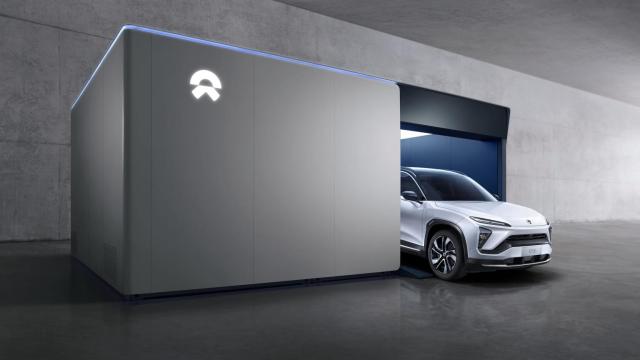Chinese electric car maker NIO announced that its 136 automated battery swap stations have completed half a million battery swaps thus far. Strategically located along China’s most congested highways, these swap stations allow NIO drivers to pull in with a depleted battery and haul arse out of the station in a few minutes with a new fully charged battery locked and loaded. For everyone who cries about long charge times, this whole process allegedly takes just three minutes from start to stop.
Tesla says that it investigated battery swapping tech, but after inviting 200 Model S owners to test the technology in remote Coalinga, Calif. the trial was cancelled over a lack of interest. According to Elon Musk, “We’ve invited all the Model S owners in the area to try it out, and of the first round of 200 invitations, only four or five people were interested. Clearly it’s not very popular.” The company instead chose to install a proprietary nationwide Supercharger charging network.
NIO customers, on the other hand, have been quite interested in getting their batteries quickly swapped. NIO Power — the subsidiary that runs the swap stations — completed its half-millionth swap recently. Its customers not only get a rapid full charge status, much faster than plugging in, but they can also choose to upgrade their batteries to modern tech at any point. If NIO introduces a new longer range battery, or upgrades the chemistry of its battery packs, customers can choose to opt for that whenever.
The service is currently free for NIO customers, subsidised by the Chinese government. There is no word on exactly what this process will cost when the subsidies end, but it doesn’t seem like it will be exceedingly expensive. At the moment, customers with a 70 kWh battery pack can temporarily upgrade to an 84 kWh or 100 kWh pack, say for a longer road trip or what have you, for around $15 per day.
In large Chinese cities, most people live in big apartment buildings without onsite EV charging infrastructure. These people rely on public charging, which can be difficult to secure as EVs continue to be more popular. This makes battery swap tech all the more important and EVs all the more viable for these city-dwellers.
This is the tech that EV naysayers have been looking forward to discrediting for a decade. If NIO does bring this tech to the U.S. market when it eventually, someday, any minute now, launches here, you’ll have to make up some other excuse for why electric cars won’t work for your lifestyle.
